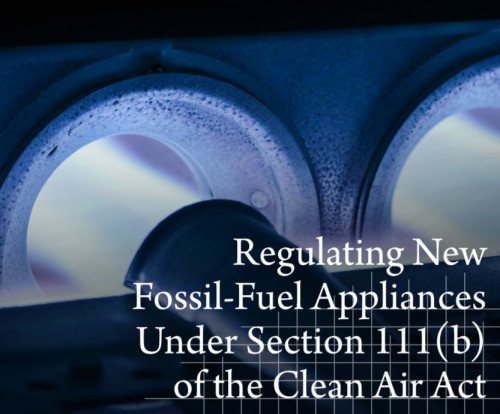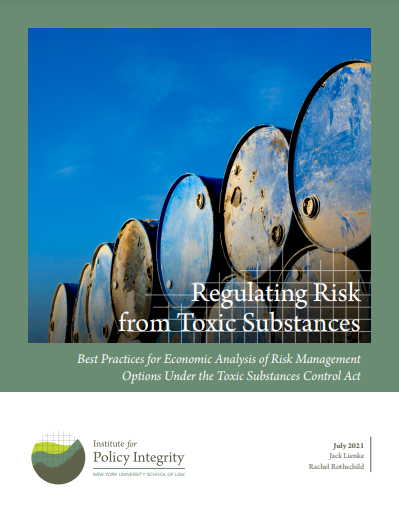-
Comments to DHS on Proposed Rule on DACA
Policy Integrity encouraged the Department of Homeland Security to supplement its justification for the rule by quantifying and monetizing key unquantified benefits in the RIA, such as improvements in mental health, increased belonging, and hope for the future. The comments also recommended that DHS offer more evidence that the DACA program has no significant effect on legal or illegal immigration and more thoroughly address litigation risk and case-by-case enforcement arguments for rescinding the program.
-
Comments to HHS on Proposed Repeal of Good Guidance Practices Rule
Policy Integrity submitted comments to the U.S. Department of Health & Human Services (“HHS”)'s request for input on its proposed repeal of the Trump Administration’s Good Guidance Practices Rule (“GGP Rule”). The rule would have increased administrative complexity in ways that harmed HHS programs and public health. Our comments explain why the rule's costs justify HHS's repeal and offer ways the department can sterngthen its justification for repeal by taking note of the aggregate costs and benefits of repealing the GGP Rule and incorporating public comments on the GGP Rule into the record.
-
Comments to the Federal Insurance Office on Climate-Related Financial Risks
Insurers face and create climate risk as underwriters, investors, and risk-carriers. We submitted comments to the Federal Insurance Office (FIO) explaining how the office could use its authority to reduce these marketplace risks and to protect the affordability and accessibility of insurance.
-
Comments to NHTSA on Proposed Car Standards
We submitted comments on NHTSA's proposed car standards, recommending ways that the agency could improve its modeling and address inconsistences between its and EPA's analyses. We also submitted joint comments on NHTSA's use of the social cost of carbon, recommending that the agency expand its justification of its discount rates and inclusion of global damages in the SCC.
-
Regulating New Fossil-Fuel Appliances Under Section 111(b) of the Clean Air Act
This report finds that EPA has authority under Section 111(b) of the Clean Air Act to set nationwide performance standards for new residential and commercial fossil-fuel appliances and that multiple means of reducing emissions from such appliances are adequately demonstrated, including the use of electric-heat-pump technology.
-
Comments to DOE on Conservation Standards for Furnaces and Water Heaters
In August 2021, DOE proposed to return to holding less-efficient gas furnaces to the same standard as other gas furnaces. We filed comments supporting the proposal, while cautioning DOE against making unnecessary statements that might hinder its ability in the future to set standards that would encourage consumers to switch from gas-fired appliances to electric appliances.
-
Comments to EPA on New Clean Car Standards
We submitted comments on the Environmental Protection Agency’s (“EPA”) notice of proposed rulemaking, Revised 2023 and Later Model Year Light-Duty Vehicle Greenhouse Gas Emissions Standards. Our comment urged EPA to: select the regulatory alternative that will maximize net social welfare and promote distributional justice; rely on legislative and regulatory history to help justify its aproach to lead time; and improve its modeling to more fully capture benefits of stronger standards.
We also submitted joint comments with a coalition of other environmental groups on EPA's use of the social cost of carbon (SCC) in its proposed regulation, recommending that the agency expand its justification its discount rates and inclusion of global damages in the SCC, and affirm that the SCC is a lower bound of projected climate impacts.
-
Comments to NHTSA on Rescinding CAFE Penalties Interim Final Rule
The National Highway Traffic Safety Administration ("NHTSA") sets corporate average fuel economy ("CAFE") standards for light-duty vehicles, and penalizes automobile manufacturers who fail to meet applicable standards. In January 2021, NHTSA issued an Interim Final Rule repealing the inflation-adjusted penalty increase for Model Years 2019-2021, which we commented was untimely and disregarded critical environmental harms.
In August 2021, NHTSA proposed to rescind the Interim Final Rule. We filed comments supporting the proposal for complying with inflation-adjustment obligations, driving fuel savings, and reducing pollution.
-
Comments to EPA and USACE on Clean Water Protections
The Environmental Protection Agency (EPA) and Army Corps of Engineers (USACE) have expressed the intention to repeal the Navigable Waters Protection Rule, which removed critical federal protections on many waterways and has been vacated by a federal court for violating the Clean Water Act. In comments filed to the agencies, we welcome the decision to replace the rule but encourage strong justification for reversing course and point to flaws in the economic analysis for the earlier rule that can support the case for replacing it.
We previously commented on the rule and its flawed economic justification, published a report on its concealed costs, and filed amicus briefs in court cases that challenged it.
-
Regulating Risk from Toxic Substances
Best Practices for Economic Analysis of Risk Management Options Under the Toxic Substances Control Act
This report identifies best practices EPA should adopt to holistically assess and weigh the costs and benefits of risk management options, allowing the agency to meet its statutory obligations and best enhance public welfare.
Viewing recent projects in Consumer and Healthcare Protection









